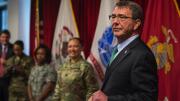Ashton B. Carter, who concluded his service as the twenty-fifth U.S. Secretary of Defense with the transition from President Barack Obama to President Donald J. Trump, is rejoining the Harvard Kennedy School (HKS). He will be Belfer professor of technology and global affairs, and will serve as director of the Belfer Center for Science and International Affairs—the locus of much of the school’s work on international security and diplomacy, environmental and resource issues, and science and technology policy.
In the latter capacity, Carter (who goes by “Ash,” rather than his full, formal name) will succeed Graham Allison, Dillon professor of government, who had led the center since 1994, and served from 1977 to 1989 as founding dean of the school in its modern incarnation. Thus, the transition represents something of a generational change at the school and the center. Carter is speaking on “Technology and Global Affairs” at the HKS forum this evening, with Allison serving as moderator and HKS dean Douglas Elmendorf making welcome remarks on the occasion.
Before his appointment as secretary of defense, Carter was the Pentagon’s second- and third-ranking official. As deputy secretary and chief operating officer from 2011 to 2013, he oversaw management, personnel, strategy, and the military budget. As under secretary of defense for acquisition, technology, and logistics from 2009 to 2011, he led procurement reform and innovation, and oversaw procurement of the KC-46 tanker, rapid support for ongoing wars, and global logistics. During earlier public service, Carter was assistant secretary of defense for international security policy from 1993 to 1996, when he oversaw the Nunn-Lugar program that removed and eliminated nuclear weapons from Russia, Ukraine, Kazakhstan, and Belarus; military planning during the 1994 crisis over North Korea’s nuclear-weapons program; and the U.S. nuclear arsenal. A physicist by training, he has long been involved in nuclear issues. Read his 2003 article on North Korea’s weaponry, written when he was Ford Foundation professor of science and international affairs.








